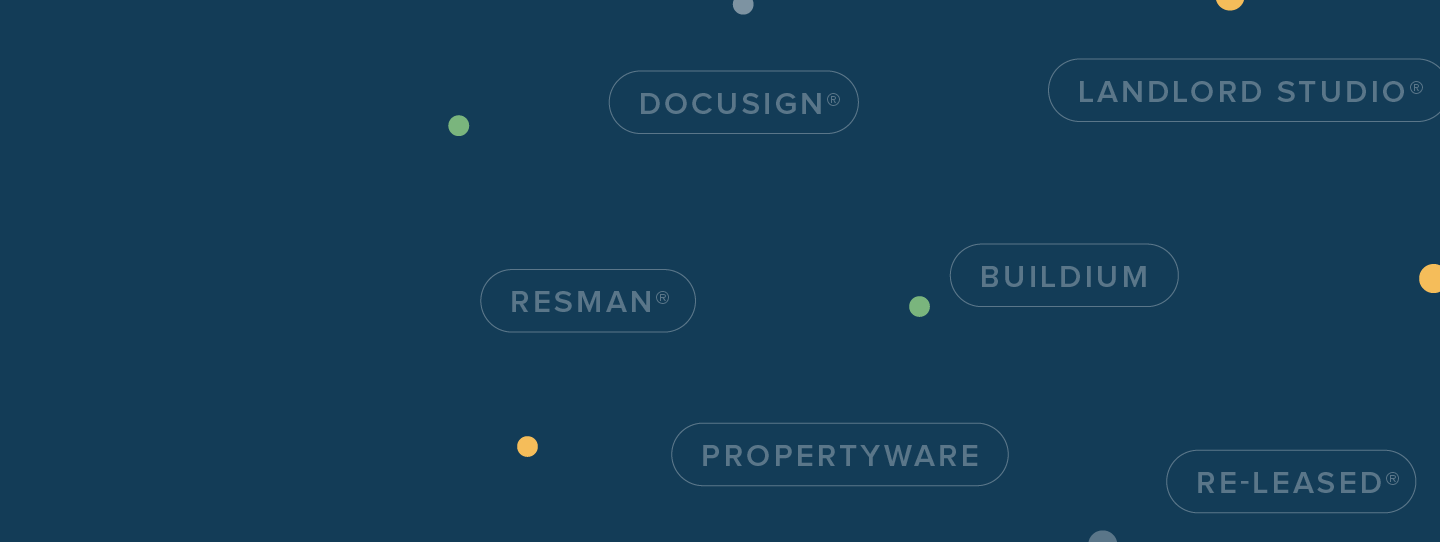It’s no secret that at the core of every successful property management business is an efficient approach to lease management. In fact, aside from rent collection, handling leasing and marketing vacancies are the most profitable services that property managers provide, according to our 2025 Industry Report. This coincides with a growing desire among renters to move more parts of the leasing process online, including applying for a property, signing the lease agreement, setting up utilities, and communicating with their PMC.
What’s the best way to meet their expectations while keeping your services as effective and profitable as possible? Investing in lease management software.
This post and accompanying video includes some of the best leasing software options available for property managers that value efficient operations, providing high-quality service to their residents, and creating new avenues to grow their business. We’ll explore features that make up the best lease management software, along with benefits and pricing details to help you make an informed purchase.
What Is Lease Management Software?
Let’s start by jumping into some definitions:
Lease management software is technology specifically designed to handle the intricacies of lease administration. Because leasing is complex and includes a variety of different tasks, the types of lease management software out there vary, as well. There are platforms built for specific tasks, such as tenant screening or lease creation, and others that help you at multiple stages of the leasing lifecycle.
Despite these variations, most lease management software shares a few common goals:
- Eliminate the need for cumbersome paper-based systems.
- Reduce the risk of human error.
- Enhance operational efficiency.
- Make leasing more user-friendly for all parties involved.
At its core, lease management software simplifies the lead-to-lease cycle by bringing the entire leasing process online, creating seamless tenant interactions, efficient document handling, and real-time access to lease information. Property managers can advertise vacancies, screen potential tenants, complete and sign lease agreements, and manage rent payments—all online and, if you’re using comprehensive property management software, do it all from a single platform.
Why Use Lease Management Software?
For property managers navigating the complexities of leasing, adopting a lease management platform can be a game-changer, enabling them to focus more on strategic growth and less on administrative burdens.
Consolidate and Reduce Your Workload
If you find yourself juggling the details of multiple properties, the ability to access a consolidated database of lease agreements, tenant details, payment records, and the lease history for each unit can save you hours every week. Leasing software usually lets you automate routine and time-consuming tasks such as listing vacancies or sending out updates to applicants. You can process larger numbers of applications simultaneously, with less risk of human error and without losing out on potential residents due to long response times.
Fill Vacancies Quickly—and with Your Ideal Tenants
You can use the software to post your listings across popular rental listing sites at once, growing your pool of potential tenants. From there, you can use tools to coordinate both in-person and virtual showings, keeping all of your appointments organized in a way that’s convenient for renters, as well.
Lease management software simplifies the application and screening process, allowing property managers to identify qualified tenants faster. Automated screening features can check potential tenants’ credit scores, rental history, and even criminal backgrounds, ensuring that the screening process is thorough, yet efficient. This all adds up to finding your ideal tenants efficiently, so you’ll minimize lost revenue and reduce future vacancies.
Provide Better Service with Less Effort
Lease management software often includes features such as automatic reminders for important dates, digital document storage, and integrated communication tools that enhance the communication between property managers and tenants. Issues are resolved promptly, which leads to improved tenant satisfaction—and all interactions are recorded for future reference.
You can even take things one step further and offer add-on services powered by integrated software solutions. These can include everything from easy utility setup upon move-in to rent reporting that helps tenants build credit over time from their on-time rent payments. These additions not only create a better renting experience for your tenants, but also open the door to new revenue streams for your business.
Refine Your Management Strategy
By using the analytics tools included in many lease management software solutions, you can gain insights into the financial performance of your properties. You can access details on a specific lease, tenant relationship, or unit to better understand what’s causing any issues and how to address them. If there’s a pattern of delinquencies or a unit that’s particularly hard to keep occupied, you’ll spot it before it becomes a serious problem for your bottom line.
On a larger scale, these tools can help you monitor the health of your entire portfolio and report back to owners with the right data to highlight the benefits your business brings. You can use that data as a baseline to make informed decisions about property investments and budget allocations, as well.
Adopting lease management software empowers property managers to provide better services, maintain high occupancy rates, and optimize their portfolio’s profitability.
Key Features of Lease Management Software
Now that we’ve tackled the what and why of lease management software, let’s break down the specific features to look for when comparing your options.
For the sake of this guide, we’ll be delving into great detail on inspections, rent payments, and overall property marketing. These can all be considered parts of the leasing lifecycle and some of the more comprehensive software options on our list excel in these areas, but they also are complex enough, with a large enough variety of purpose-built software to warrant their own guides.
Luckily, we have posts available that explore each of these categories:
- The 5 best property management inspection software options in 2025
- Some of the 6 best property management marketing tools and software in 2025
- The best rent payment app in 2025: Comparing 8 online rent payment systems
Rental Listings and Showings
Lease management software that contains rental listing tools can give your properties a leg up in the rental market. With integrated tools for listing creation, property managers can input property details, upload high-quality photos, and craft compelling descriptions within a single platform. The best software lets you post these listings across multiple listing sites and digital channels simultaneously, expanding the property’s visibility without requiring additional effort for each posting. On-platform management allows for real-time updates across all sites, so you can keep information up to date and make changes to listing details as needed. When it’s time to relist a property, you’ll have all the relevant information on hand to save even more time.
Beyond simply creating listings, lease management software can streamline showings for both property managers and prospective tenants. Interested applicants can view available showing times and book appointments directly through the software, often with automated confirmation and reminder emails or messages sent to both parties. This reduces the burden on property management staff, avoids scheduling conflicts, and enhances the overall experience for prospective tenants.
Many software solutions offer virtual tour capabilities, as well, allowing potential tenants to explore properties remotely. By facilitating easier access to property showings—both in person and virtually—lease management software sets the stage for your ideal renters to take the next step and submit an application.
Online Rental Applications
Online rental applications significantly reduce the burden on property management teams, while giving renters a way to submit their information securely and conveniently from anywhere, at any time, through an online platform. For potential tenants, this convenience is an expectation.
Typically, online application software provides one or several standardized application forms that a property manager can customize to include specific requirements or questions relevant to the property. This speeds up the review process and lets you tailor applications to get all the information you need.
Software can automate communication with applicants, sending acknowledgments of application receipt, updates on application status, and eventually, approval or rejection notifications. This level of automation and efficiency in handling applications not only saves time for property managers but also improves the experience for prospective tenants, making the property more appealing and competitive in the market.
Tenant Screening
Once applications are submitted, property managers can access, review, and compare them easily within the software platform. Many lease management systems integrate with background check and credit report services, allowing for fast, thorough screening with comprehensive, consistent, and legally compliant screening criteria.This feature should integrate seamlessly with the application process, enabling property managers to initiate background checks, credit assessments, and even rental history reviews as soon as an application is received.
By consolidating these checks into a single, streamlined process, the software reduces the time and effort required to vet applicants, while standardizing the screening process to ensure fairness and compliance with housing regulations.
The automation of these checks ensures a consistent screening process for every applicant, eliminating human bias and enhancing the integrity of the selection process. Taken together with rental application tools, you can use screening technology to find and approve your ideal tenants, minimizing turnover and associated costs.
Document Storage and Management
Lease management software should include customizable lease templates that provide property managers with the flexibility to tailor lease agreements to meet specific needs and comply with local legal requirements. This functionality allows for the creation of a base template that includes standard lease terms, conditions, and clauses.
From there, property managers can modify and add specific details relevant to each property or lease scenario, such as rent amount, lease duration, security deposit details, and policies on pets or subletting. This customization capability lets you align each agreement with your policies and local laws.
Many lease management software platforms include electronic signature (eSign) capabilities, so relevant parties can send, sign, store, and access agreements digitally. Having your leasing documents available at any time lets you draft new agreements more quickly, reducing the potential for error. You can organize these documents within your software platform for easy reference whenever you need them.
Tenant Communication
Lease management software should offer a variety of tenant communication features that facilitate efficient and transparent interactions between property managers and tenants. One key feature is an integrated messaging system, which allows for direct, instant communication within the platform. This often includes email and SMS functionalities.
Another important feature is a notification system, which should automatically alert tenants about upcoming rent due dates, lease renewal reminders, and scheduled maintenance or inspections, for example.
Your lease management software should include a tenant portal, as well, offering tenants a self-service option where they can view their lease documents, pay rent online, submit maintenance requests, and access a history of their payments and communications. This portal gives them control over their rental experience and reduces the administrative burden on property managers by automating routine tasks.
Pro Tip: You can also use a portal to collect tenant feedback through surveys or feedback forms.
Analytics and Insights
The best lease management software comes equipped with advanced analytics features to provide property managers with data that helps them make informed decisions. These features typically include financial analytics, occupancy rate analysis, and lease expiration tracking.
Financial analytics tools offer a comprehensive overview of the property’s financial performance, tracking income from rent and other fees, and monitoring expenses such as maintenance and operational costs. This enables property managers to assess profitability, identify trends, and make adjustments to improve financial outcomes.
Occupancy rate analysis helps in understanding the property’s rental demand by showing the percentage of occupied units over time, allowing managers to gauge the effectiveness of their marketing strategies and tenant retention efforts.
Lease expiration tracking ensures that property managers are aware of upcoming lease renewals well in advance, enabling them to strategize on lease negotiations or prepare the unit for re-listing.
Lease management software can even incorporate predictive analytics to forecast future trends based on historical data. This can include predictions on market rent changes, identifying potential vacancies before they occur, and suggesting optimal lease renewal rates. These insights can help you make decisions that improve occupancy rates and increase revenue.
1. Buildium: The Best All-In-One Lease Management Software
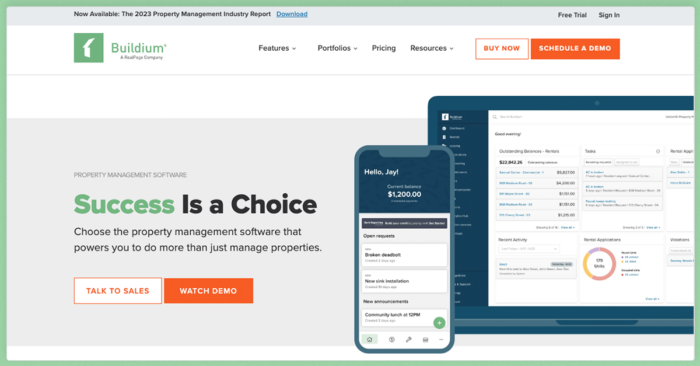
Buildium’s® comprehensive property management software is purpose-built to meet the needs of property managers, including the entire leasing lifecycle.
Buildium’s technology is customizable to fit various portfolio sizes and types, including single-family homes, multifamily units, community associations, commercial, or any mix of different properties. Whether you manage a handful of properties or hundreds, Buildium has a full toolkit to handle any task efficiently.
The flexibility of Buildium’s software combined with an ever-growing Marketplace of property management-specific technology partners can help you grow your business and create new revenue streams at each step of the leasing process.
Here’s a look at some of the lease management software partners that are fully integrated with Buildium and available in the Marketplace:
- Tenant Turner® for rapid listing syndication across top sites, inquiry fielding for prospective applicants (through calls, email, and text), and showing scheduling assistance
- ShowingHero® for fielding all rental lead calls and messages 24/7/365, showing coordination, secure self-tours, and showing performance metrics
- Obligo® for flexible security deposit programs and deposit-free options (with the same owner protections of traditional deposits) to attract more renters and improve tenant satisfaction
- PetScreening® for efficient screening of tenants’ pets and validation of assistance animal accommodation requests to support low risk pet policies that attract rather than deter potential tenants
- Nutiliti® for easy utility activation and full handling of the bill-back process, from invoicing to collections
- Gravy® for creatively incentivizing profitable tenant behavior, such as lease renewals and on-time payments, without additional costs to property managers
Features
Buildium’s partner integrations enhance several components of lease management, but its core features are even more far-reaching. The software is accessed easily through a unified platform and is designed with specialized property management workflows in mind.
This approach lets you manage the entire lead-to-lease lifecycle efficiently, along with resident communication, maintenance tracking, bookkeeping, payments, owner communication, marketing, and business performance monitoring.
These features include:
- Easy listing creation and syndication in just a few clicks, including the ability to edit listing descriptions as needed, store details for future listings, manage both listed and unlisted units, organize inquiries by designating specific leasing agents as points of contact, and promote your listing across major listing sites such as Apartments.com®, Apartment List®, the entire Zillow Rental Network®, Zumper®, and Rent, Dwellsy and Rental Beast.
- Showings Coordinator, powered by Tenant Turner, to let prospective tenants schedule showings instantly, automatically syncing with your calendar to determine availability, along with automated email and text follow-up messages and centralized management of all your listings, showings, and prospects within Buildium’s platform
- Efficient online applications and thorough tenant screening, with customizable applications, one-click sharing, and application management through a single dashboard
- An easy rental agreement signing and move-in process, including fully customizable lease agreement templates, eSignature powered by Dropbox® Sign, and Renters Insurance powered by MSI®
- A Resident Center, including a dedicated mobile app that your team and prospective tenants can use to communicate, share documents, and complete requests on the go. Once they become your residents, renters can use the portal to make payments, request repairs, and access important information regarding their lease
- Business performance metrics via a suite of reporting tools on your lease process, individual properties, your full portfolio, and the health of your entire business
- Business and property marketing tools through a free website and listing syndication, online applications, tenant screening, and online lease signing
- A complete maintenance and repair system that includes ticketing, tracking, and real-time communication through Resident Center and the property management dashboard
- Automated electronic payments for everything from rent (ACH and credit card payments) to association dues and other fees, along with accounting tools and 1099 eFiling
Pricing
Buildium offers three pricing tiers. All tiers include:
- Online Portals
- Resident & Association Board Member Communications
- Accounting
- Maintenance Task Management
- Violations
Each tier is designed to support your overall business and property management efforts, while helping you maintain consistent and transparent communication with your tenants and property owners.
Essential: Starting at $58/month, Essential includes Buildium’s core features and is intended for property management companies who are looking for basic accounting and task management tools.
Growth: Starting at $183/month, Growth is the plan for property managers that want to grow without worrying about the cost of scaling.
Premium: Starting at $375/month, Premium is meant for management companies focused on introducing automation more thoroughly into their workflows to boost efficiency. Premium features Buildum’s Open API and Priority Support from the Buildium team.
2. Propertyware: Customizable Lease Management Software for Single-Family Properties
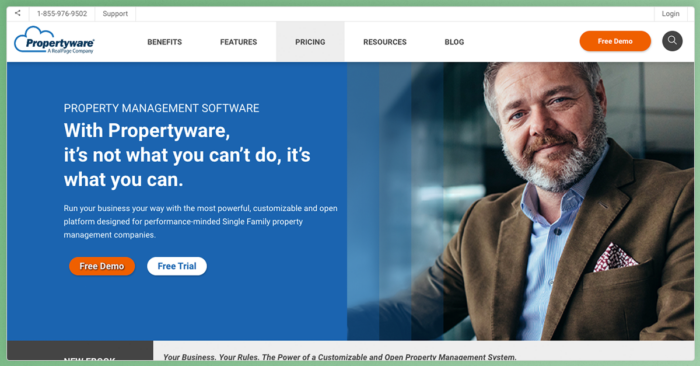
Propertyware® is a highly flexible, fully customizable property management platform designed to help property managers better control and streamline every aspect of their portfolio.
Propertyware’s technology works particularly well for property managers with single-family homes in their portfolio, with features that can accommodate other property types, as well.
Features
Propertyware’s features include the ability to set up custom fields, dashboards and reports. This level of customization can take time and experience, but it is often highly useful for more experienced property management companies with specific and unique needs.
Propertyware includes an open API, as well, meaning you can integrate other property management apps, or even build your own and connect them with the Propertyware user dashboard easily.
Aside from these customization tools, there’s also a full suite of purpose-built features to handle lease management, accounting, maintenance, multi-location management, vendor credentials, utility and bill management, and owner and resident insurance.
To help make your leasing process more efficient, the platform includes a rental listing widget, tenant screening (supported by AI), a tenant portal that gives your residents 24/7 account access, and the AssetProtect tenant liability program that protects units against accidental damage at a low cost.
All these features make Propertyware ideal for larger property managers or management companies who need a high level of customization. Smaller property managers, or those looking for software that’s flexible but doesn’t need as much customization, may find Buildium a better fit for their needs.
Pricing
Propertyware organizes their pricing into three tiers: Basic, Plus, and Premium.
Basic starts at $1 per unit per month, with a $250 minimum. Plus starts at $1.50, with a $350 minimum and Premium starts at $2 with a $450 minimum.
The one-time implementation cost for all three tiers is twice the monthly subscription price.
3. Landlord Studio: Easy-to-Use Lease Management Software for Smaller Door Counts
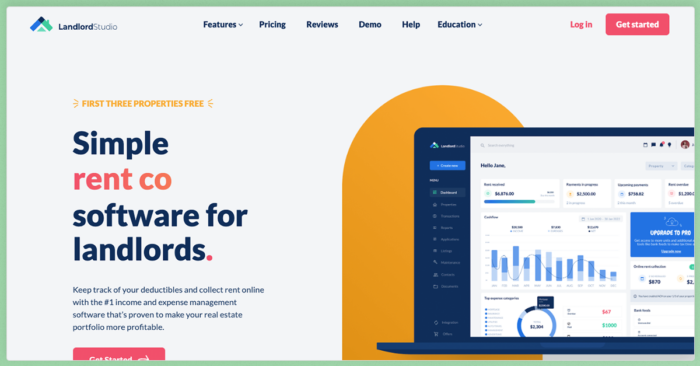
Landlord Studio® is specialized property management software that connects your tenant screening, rent collection, and accounting processes. Its platform prioritizes simplicity and focuses on a few key features, making it a better fit for property managers with smaller door counts as opposed to those looking for more extensive, customizable features.
Features
Landlord Studio’s software includes a handful of useful lease management features, including:
- free rental listing setup and syndication across top sites such as Zillow, Trulia, Hotpads® and Zumper
- online rental application creation and sharing with a built-in prescreening questionnaire
- applicant management and managing from within Landlord Studio’s platform
- a Landlord Studio tenant screening report provided by TransUnion SmartMove® (reports cost $40 each)
- Online rent, late fee, deposit, and other fee collection with automatic payment options
In addition to its lease management software, Landlord Studio includes maintenance tracking and accounting features that let you automate your income and expense tracking, categorize expenses, and generate financial reports—there are 15 industry-specific reports available on the platform—that can be shared with owners and used for tax filing.
Pricing
Landlord Studio offers two types of plans.
The Go plan is free and includes up to three units (with unlimited free units available if you meet certain conditions), manual income expense tracking, online rent collection, maintenance tracking, access to basic reports, and a GPS mileage calculator.
The Pro plan is $12 per month for three units and an additional $1 per month for each additional unit if paid annually. It includes multi-user access, automatic bank fees, recurring expenses, unlimited receipt and document storage, advanced reports, automated reminders, Xero® integration, and the ability to export all your data.
4. ResMan: Efficient Lease Management Software for Multifamily Properties and Affordable Housing
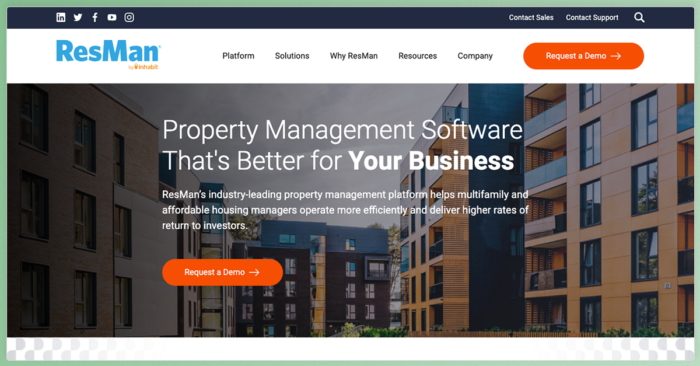
ResMan® includes lease management software tools that are specifically built for property managers and owners of multifamily and affordable housing units. They combine marketing and investor management features focused on growing your multifamily portfolio.
Features
ResMan includes a variety of leasing features, including:
- automated lead management workflows
- online applications with built-in tenant screening
- transparent communication and online payments through the Resident Portal
- utility solutions with automatic invoice processing
- online lease management through three distinct plans: leasing, Leasing Pro, and Leasing Pro Flex
In addition to these features, ResMan offers tools for accounting, reporting, budgeting, compliance and CRM.
Pricing
There’s no pricing information for ResMan’s plans available on their site, so you’ll have to contact their sales team to receive a custom quote.
5. Re-Leased: Lease Management Software for Commercial Properties
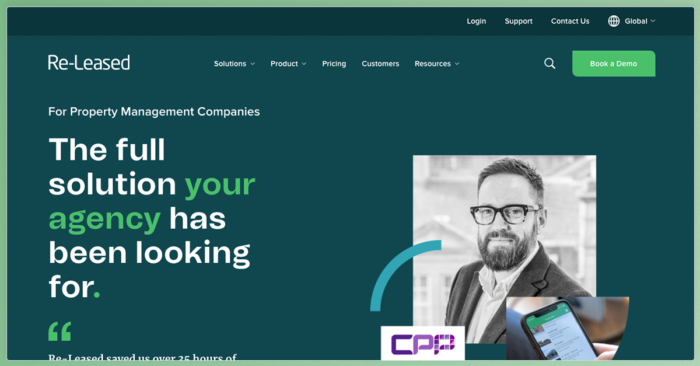
Re-Leased® is highly specialized lease management software for commercial properties. If your portfolio contains primarily commercial units, or if you’re looking for a tailored solution to support the commercial properties in a mixed portfolio, then this platform could be the right fit.
Re-Leased’s software helps you run your business more efficiently by storing important lease and property information in a single cloud-based system, so you’ll have visibility into the details you need when you need them. It also lets you set up automatic alerts, communication with tenants, and task updates for your different workflows.
Features
With a particular focused on automation and visibility, Re-Leased lease management tools let you:
- Create and send rent and recoverable cost invoices
- Track on-time payments and which tenants are in arrears
- Send out personalized communication to tenants
- Utilize separate mobile apps for property managers, tenants, and landlords
- Manage rent reviews, lease renewals and expirations, and maintenance tasks specific to each lease
- Give tenants full visibility into their relevant documents, lease details, and payment records
Re-Leased also includes Re-Lease Pay™, powered by Stripe®, a tool to set up automatic recurring payments, accept debit or credit card payments through the mobile Tenant App, and invoice reconciliation for faster accounting.
Pricing
Re-Leased has three pricing tiers. The Core tier includes essential features such as:
- lease administration
- budgeting
- rent arrears and credit control
- an insights dashboard, operational summary
- Re-Leased Pay
- two-way accounting integrations
- email and SMS support
- the tenant mobile app
- standard property reports
- and access to an app marketplace
The Pro tier adds on team performance tools, a management fee dashboard, the full mobile app suite, and an invoice intelligence feature.
The Enterprise tier contains all the features of the Pro tier, plus strategic asset management dashboards, expanded report builder and invoice intelligence offerings, and API access.
To get specific pricing details for all three plans, you’ll need to contact the Re-Leased sales team directly.
6. Docusign: Well-Established Software for Online Lease Signing
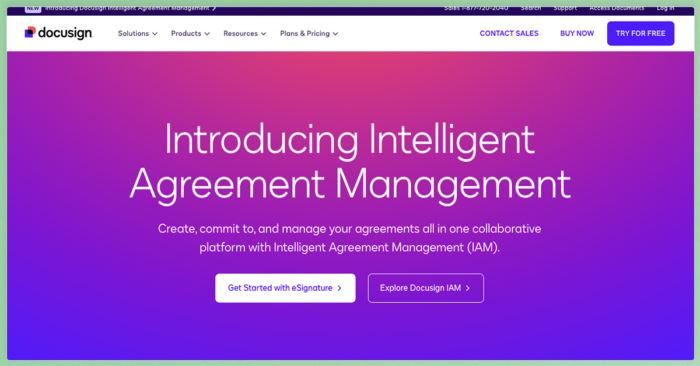
You’re probably already familiar with the next software option on our list. Docusign® is an established provider of eSignature technology that supports digital document sharing and management.
Docusign is intended for use across various industries and sectors and isn’t specifically built for property management, meaning it might not offer the level of control, industry-specific customization, and flexibility of other software on the list. It’s not part of more extensive lease management or property management software, either, so you may need to rely on other tools to make the rest of your leasing process more efficient and profitable.
For these reasons, Docusign is best suited for property managers looking for software that’s limited to document sharing and signing and one that’s already recognizable to their team and to applicants.
Features
Docusign’s eSignature features include template documents, a PowerForms tool to help you create your own documents faster, the ability to add your branding to documents, a PDF converter, a drawing option for freeform signatures, automatic tag placement on documents, the ability for signers to edit certain fields, a variety of document sharing and signer authentication options, automated email reminders, archiving tools, and mobile and offline signing.
You can find a full list of product features and integrations on Docusign’s website.
Pricing
Docusign has three main pricing plans that are specific for real estate and that encompass lease agreements.
The Real Estate Starter plan is $10 per month and includes five envelopes (digital containers that you can use to send multiple documents tied to an agreement) per month, access to standard real estate forms, and a mobile app. The plan only includes access for one user.
The Real Estate plan is $25 per month per user for up to five users and includes the core features plus the ability to strike through text, a digital workspace to organize transactions, custom branding, collaborative comments, and signer attachments.
The REALTORS® plan is a NAR member exclusive and is $20 per month per user for up to five users and includes some additional NAR-specific features.
Docusign offers customizable plans that you can learn more about by contacting their sales team, as well as generic eSignature plans. These include a Personal plan for $10 per month, a Standard plan for $25 per month and a Business Pro plan for $40 per month.
The pricing for all these plans increases if you choose monthly billing instead of an annual plan.
What Is the Best Lease Management Software for Your Business?
So, what’s the best software out of the lot? The answer comes down to your own priorities and the weak spots in your leasing process. Occasionally, software with a specific functionality such as eSigning can be all you need, but, more often than not, property managers can benefit from a unified platform that supports them through every phase of the lease lifecycle. This makes managing your operations easier while simplifying leasing for renters.
We recommend testing multiple options to see what works for you. Luckily, Buildium offers a free 14-day trial with no credit card required. You can put it to test risk free and see just how much it can benefit both you and your customers.
Frequently Asked Questions
What should I consider when choosing lease management software?
When choosing lease management software, property managers should consider several key factors to determine whether an option meets their specific needs and enhances their overall property management operations. These criteria should include:
- Functionality and Features: The software should offer a comprehensive set of features that covers the full spectrum of property management tasks, including tenant screening, lease creation and management, rent collection, maintenance requests, and financial reporting. Advanced functionalities such as automatic reminders, document storage, and communication tools can streamline operations further.
- Ease of Use: The software should be intuitive and user-friendly for both property managers and tenants. Software that is easy to navigate will improve efficiency and reduce the time needed for training and adaptation.
- Customization and Scalability: The ability to customize the software according to the specific needs of a property or portfolio is important if you want technology that can scale with your business. The software should also be scalable, capable of growing with your business as you acquire more properties or expand your operations.
- Integration Capabilities: Look for software that can integrate seamlessly with other tech you’re using, such as accounting tools, payment platforms, and credit screening services. The best software already includes these features as part of their service offerings.
- Mobile Accessibility: Having mobile access to lease management software is an expectation for many renters and is a big part of elevating the leasing experience for them. The software should offer a mobile app or be mobile-friendly, allowing property managers and tenants to perform tasks and access information on the go.
- Security and Compliance: The software must have robust security measures in place to protect sensitive information, such as personal tenant data and financial records. Compliance with legal and regulatory standards, including data protection laws, is also important.
- Cost-effectiveness: Evaluate the software’s pricing structure to ensure it fits within your budget while meeting your requirements. Consider both the upfront costs and any ongoing fees, such as subscriptions or per-transaction charges. Then, weigh them against the long-term value and cost savings that a solution can provide.
- Reputation and Reviews: Research the software provider’s reputation and read user reviews to gain insights into the software’s performance, reliability, and customer service quality.
Can lease management software integrate with other property management software tools?
The best lease management platforms offer features such as a marketplace of partners, an open API, and customizable workflows that let you connect other tools you’re already using or technology you introduce down the road.
When comparing solutions, keep these factors in mind. hey can go a long way in supporting business growth and extend the positive impact that lease management software can have on your operations.
Is lease management software suitable for both residential and commercial property management?
Yes, lease management software can be suitable for both residential and commercial property management, but most platforms out there specialize in one or the other. As you take a closer look at a specific platform, check customer reviews and product pages to see what kind of portfolios the software in question is intended for.
Buildium is an example of software that’s well-suited for mixed portfolios that include both commercial and residential properties. However, this kind of flexibility isn’t the norm, so research your options to confirm that you’re making the right choice.
What level of support and training is typically provided for users adopting lease management software?
The level of support and training provided for property managers adopting lease management software can vary widely depending on the software provider, but several common types of support and training features are typically available. These range from standard customer support, training sessions, and onboarding programs, to online knowledge bases, community forums, and video tutorials.
When comparing software, you should inquire about the specific support and training options available, including their formats, schedules, and any additional costs involved. Keep in mind that level of support is often scaled to different pricing tiers.
A software provider that offers robust support and training can significantly improve how quickly and extensively you benefit from your investment, so be sure to do your research before committing to a platform.
How much does lease management software cost?
The cost of lease management software can vary widely based on several factors, including the software’s features, the number of properties or units managed, and whether the software is cloud-based or installed on-premises. The top options out there are usually transparent with their pricing and let you access specifics easily on their site.
When considering pricing, take a value-centric approach. This involves taking the time to look beyond the sticker price to determine the long-term value you can expect from the tools you’re investing. To help make a decision, look for no-risk free trials. These trials can give you a better understanding of how the software actually works in practice and where you can expect tangible benefits.

